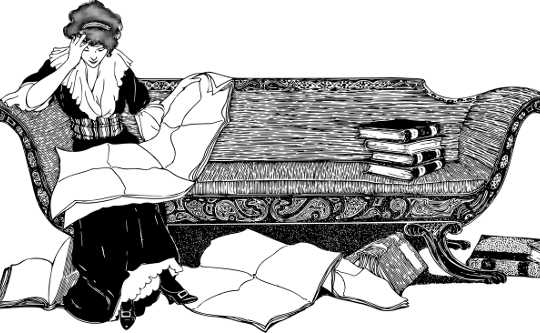
Image by Gordon Johnson
People on Medicare who later receive a diagnosis of dementia are more likely have unpaid bills as early as six years before a clinical diagnosis, research finds.
The study also finds that these missed payments and other adverse financial outcomes lead to increased risk of developing subprime credit scores starting 2.5 years before a dementia diagnosis. Subprime credit scores fall in the fair and lower range.
The findings, which appear in JAMA Internal Medicine, suggest that financial symptoms such as missing payments on routine bills could be used as early predictors of dementia and highlight the benefits of earlier detection.
“Dementia was the only medical condition where we saw consistent financial symptoms…”
“Currently there are no effective treatments to delay or reverse symptoms of dementia,” says lead author Lauren Hersch Nicholas, associate professor in the Department of Health Policy and Management at the Johns Hopkins Bloomberg School of Public Health. “However, earlier screening and detection, combined with information about the risk of irreversible financial events, like foreclosure and repossession, are important to protect the financial well-being of the patient and their families.”
Unpaid bills and dementia
The analysis finds that the elevated risk of payment delinquency with dementia accounted for 5.2% of delinquencies among those six years prior to diagnosis, reaching a maximum of 17.9% nine months after diagnosis. Rates of elevated payment delinquency and subprime credit risk persisted for up to 3.5 years after beneficiaries received dementia diagnoses, suggesting an ongoing need for assistance managing money.
The study also found that beneficiaries diagnosed with dementia who had a lower educational status missed payments on bills beginning as early as seven years before a clinical diagnosis as compared to 2.5 years prior to a diagnosis for beneficiaries with higher educational status.
Dementia, which the study identifies as diagnostic codes for Alzheimer’s disease and related dementias, is a progressive brain disorder that slowly diminishes memory and cognitive skills and limits the ability to carry out basic daily activities, including managing personal finances. About 14.7% of American adults over the age of 70 are diagnosed with the disease. The onset of dementia can lead to costly financial errors, irregular bill payments, and increased susceptibility to financial fraud.
For their study, the researchers linked de-identified Medicare claims and credit report data. They analyzed information on 81,364 Medicare beneficiaries living in single-person households, with 54,062 never receiving a dementia diagnosis between 1999 and 2014 and 27,302 with a dementia diagnosis during the same period. The researchers compared financial outcomes spanning 1999 to 2018 of those with and without a clinical diagnosis of dementia for up to seven years prior to a diagnosis and four years following a diagnosis. The researchers focused on missing payments for one or more credit accounts that were at least 30 days past due, and subprime credit scores, indicative of an individual’s risk of defaulting on loans based on credit history.
In the checkbook
To determine whether the financial symptoms observed were unique to dementia, the researchers also compared financial outcomes of missed payments and subprime credit scores to other health outcomes including arthritis, glaucoma, heart attacks, and hip fractures. They found no association of increased missed payments or subprime credit scores prior to a diagnosis for arthritis, glaucoma, or a hip fracture. No long-term associations were found with heart attacks.
“We don’t see the same pattern with other health conditions,” says Nicholas. “Dementia was the only medical condition where we saw consistent financial symptoms, especially the long period of deteriorating outcomes before clinical recognition. Our study is the first to provide large-scale quantitative evidence of the medical adage that the first place to look for dementia is in the checkbook.”
About the Authors
Additional researchers of the study are from the Federal Reserve Board of Governors and the University of Michigan Medical School.
Source: Johns Hopkins University

Related Books:
Atomic Habits: An Easy & Proven Way to Build Good Habits & Break Bad Ones
by James Clear
Atomic Habits provides practical advice for developing good habits and breaking bad ones, based on scientific research on behavior change.
Click for more info or to order
The Four Tendencies: The Indispensable Personality Profiles That Reveal How to Make Your Life Better (and Other People's Lives Better, Too)
by Gretchen Rubin
The Four Tendencies identifies four personality types and explains how understanding your own tendencies can help you improve your relationships, work habits, and overall happiness.
Click for more info or to order
Think Again: The Power of Knowing What You Don't Know
by Adam Grant
Think Again explores how people can change their minds and attitudes, and offers strategies for improving critical thinking and decision making.
Click for more info or to order
The Body Keeps the Score: Brain, Mind, and Body in the Healing of Trauma
by Bessel van der Kolk
The Body Keeps the Score discusses the connection between trauma and physical health, and offers insights into how trauma can be treated and healed.
Click for more info or to order
The Psychology of Money: Timeless lessons on wealth, greed, and happiness
by Morgan Housel
The Psychology of Money examines the ways in which our attitudes and behaviors around money can shape our financial success and overall well-being.






















